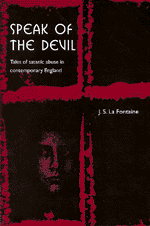 | |
| Author | Jean Sybil La Fontaine |
|---|---|
| Language | English |
| Subject | Satanic ritual abuse |
| Genre | Non-fiction |
| Publisher | Cambridge University Press |
Publication date | 1998 |
| Publication place | United Kingdom |
| Pages | 224 |
| ISBN | 0-521-62934-9 |
| OCLC | 36548968 |
| 364.15/554/0941 21 | |
| LC Class | HV6626.54.G7 L3 1998 |
Speak of the Devil: Tales of Satanic Abuse in Contemporary England is a scholarly book by J. S. La Fontaine published in 1998 that discusses her investigation of allegations of satanic ritual abuse made in the United Kingdom. The book documents a detailed investigation of the accounts of children during a wave of allegations of satanic ritual abuse, as well as the processes within the social work profession that supported the allegations despite a lack of evidence. [1]